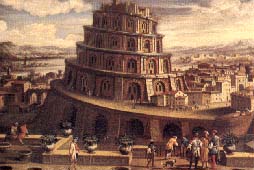
Write down a short list of actions; then write two or three possible motives for each action
Make a list of possible motives for building a city
History/Story
[Look at a map of the Middle East that includes the Mediterranean Sea] - Mt. Ararat is located between the south side of the Caspian Sea and the southern part of the Black Sea; The land of Shinar is located east of Mt. Ararat, probably north to northwest of Assyria (in ancient times); after the dispersion, Ham’s son Canaan moved to the land of Israel (land of Canaan); Ham’s grandson Nimrod ruled Shinar and Assyria; Japheth and company inhabited the north and south coasts of the Mediterranean Sea, especially the Nile Delta; Shem and company inhabited ancient Babylonia - Abraham came from Shem
Parallel time lines
Flood --------------- 101 ------------------- Dispersion
Shem - 2 - Arphaxad - 35 - Salah - 30 - Eber - 34 - Peleg
Ham ------ ? ------ Cush ------ ? ------ Nimrod --------> Nimrod rules Babel
The world had only one language, and everyone lived together, but everything was about to change, beginning with one brick...
In Genesis chapter 4 we find out that people had already begun to live in tents, play instruments (the harp and flute), and work with iron and bronze. In chapter 11, we find that bricks have been invented to replace stones. The people decided to make a test batch of bricks, probably to find out what the bricks were capable of and how heavy they would be and how long it would take to make them. These bricks were probably not like the red bricks we think of; they were probably huge, like those used to build a pyramid.
So the city would probably house about 35 families. There was no need for fortification because everyone on earth was together. City life was probably made possible by the new freedom to eat anything that lives and moves (Gen. 9:3). Unfortunately, the city was not finished until after the dispersion.
This was due in part to mankind’s motive in building the city. The purpose for the city (and the tower) was to avoid becoming scattered, to avoid wandering apart.
The tower may have served many different purposes. It would have undoubtably been the focal point of the city, with everything else built up around it. It would have also been visible from a great distance, acting like a beacon to guide shepherds or travelers to it. It could have possibly been a religious center. This is usually thought to be the case because the tower would be designed to reach into the heavens. However, the word for “heavens” in Hebrew may be singular or plural, so it might only be referring to reaching into the sky. In any case, the tower would be a focal point of the community in the same way religion often is.
It is obvious that the tower was intended to represent the pinnacle of mankind’s achievement. The people wanted to do something in order to make a name for themselves.

Something about the humans’ activities did not bode well in God’s eyes. We are not told whether or not the people living at the time of the Flood had only one language, but we do know that they were desperately wicked. God’s statement that anything would be possible for these people may have been hinting that they would be capable of even greater wickedness. Man is primarily motivated by experiencing the most pleasure and the least pain. So he steals to avoid working to earn things, he lies to avoid consequences, he commits fornication and adultery instead of getting married and staying with one person, he creates his own god instead of acknowledging and obeying the true God.
I believe that God was concerned regarding the future activities that these people might conceive and carry out. This would be similar to keeping Adam and Eve from also taking from the tree of life so that they might live forever with a sinful nature. Out of His love for His creations, He confused their language. You will remember that God is motivated by love and justice, both. God did not simply separate the people into two or three languages; He separated them into at least six if not nine or more (see Genesis 10:5, 20, & 31).
Not only did God confuse the language of the people, but He also scattered them abroad. I believe that the phrases “over all the earth” and “over the face of the whole earth” literally mean that God transported people to each different continent, which were possibly separated from each other as a result of the Flood. While it is obvious that a core group remained in the Middle East, there are many nations mentioned in Genesis chapter 10 that we do not ever hear of again. The core group then separated as indicated in Genesis 10:5, 10-12, 19, & 30 and in the map details above.
It is not clear why God chose to do this in addition to confusing the people’s language....